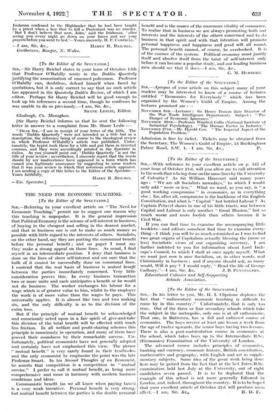THE NEED FOR ECONOMIC TEACHING. [To the Editor of the
SPECTATOR.] Sin,—Referring to your excellent article on. " The Need for Economic Teaching," permit me to suggest one reason why this teaching is unpopular. It is the general impression that Political Economy is the science of self-interest in business, of buying in the cheapest and selling in the dearest market, and that in business one is out to make as much money as possible with little regard to the interests of others. Socialists, on the other hand, say they are putting the communal benefit before the personal benefit ; and on paper I must say they make a strong appeal on those lines. As usual, I find myself in an intermediate position. I deny that business is done on the lines of sheer self-interest and am sure that the bulk of it cannot be successfully done on communal lines. I contend that the real basis of business is mutual benefit between the parties immediately concerned. Very little consideration proves this. In every business transaction two or more unite and each anticipates a benefit or he would not do business. The worker exchanges his labour for wage which is of greater value to him, whilst to the employer the work is of more value than the wages he pays. This universally applies. It is almost like two and two making six, and the only difficulty is as to the division of the extra two.
But if the principle of mutual benefit be acknowledged and consciously acted upon in a fair spirit of give-and-take this division of the total benefit will be effected with much less friction. In all welfare and profit-sharing schemes this principle is consciously in operation, and many of them have proved their soundness by their remarkable success. Un- fortunately, political economists have not generally adopted and certainly have not emphasized this view. The phrase " mutual benefit " is very rarely found in their textbooks, and . the only economist to emphasize the point was the late Professor Smart. In his Second Thoughts of an Economist, he asserts that competition is a competition in " mutual service." I prefer to call it mutual benefit, as being more comprehensive and more in harmony with modern business conditions and ideas.
Communistic benefit (as we all know when paying taxes) is a very; weak incentive. Personal benefit is very strong, but mutual benefit between the parties is the double personal
benefit and is the source of the enormous vitality of commerce. To realize that in business we are always promoting both our interests and the interests of the others concerned and to do business in that spirit and with that intention will promote personal happiness and happiness and good will all round. The personal benefit cannot, of course, be overlooked. It is of the essence of the system. Political economy must justify itself and absolve itself from the taint of self-interest only before it can become a popular study, and our leading business men should see that it does.—I am, Sir, &e.,
G. M. HERBERT.






































 Previous page
Previous page